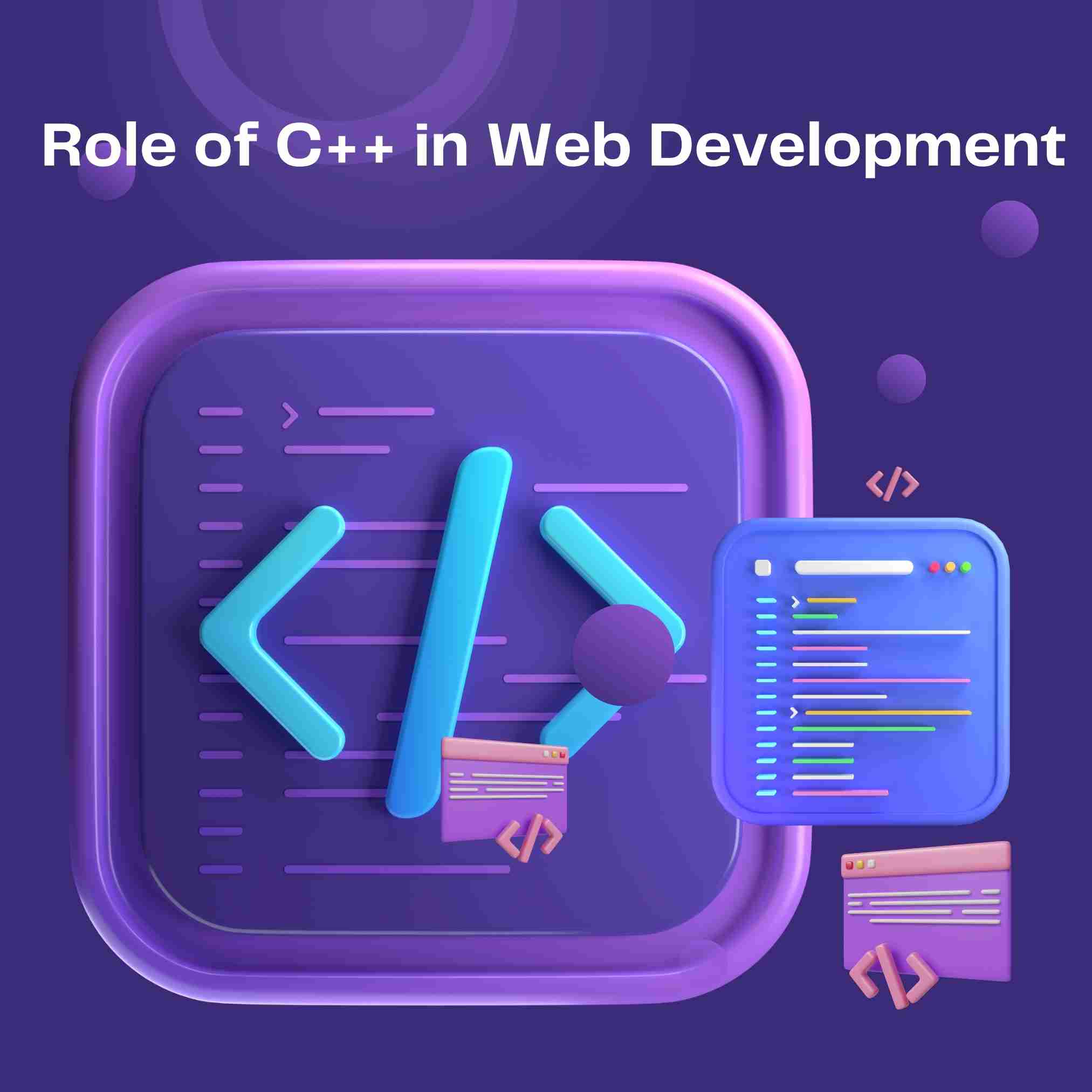Role of C++ in Web Development: A Comprehensive Guide

Role of C++ in Web Development – In the dynamic landscape of web development, various programming languages have emerged as frontrunners, each catering to specific needs and preferences. One such language that has stood the test of time and continues to be a cornerstone in software development is C++. Traditionally renowned for its power, efficiency, and performance in system-level programming, C++ might not be the first language that comes to mind when thinking about web development. However, as technology evolves, so do the capabilities of programming languages. In this article, we will delve into the question: Can C++ be used for web development?
Exploring the Role of C++ in Web Development: A Comprehensive Guide
A. Understanding C++
Before exploring C++’s applicability in web development, it’s crucial to understand what C++ is and why it has been a prominent language in the software development domain. C++ is a general-purpose programming language that is an extension of the C programming language. It was developed by Bjarne Stroustrup at Bell Labs in the early 1980s with the aim of adding object-oriented features to C. C++ has since become one of the most widely used programming languages, known for its efficiency, performance, and versatility.
B. C++ in System-Level Programming
C++ has historically been recognized for its role in system-level programming, where low-level memory control and performance are critical. Its ability to directly manipulate hardware resources and memory makes it a preferred choice for developing operating systems, device drivers, game engines, and other performance-intensive applications.
C. The Evolution of Web Development
Web development has evolved significantly over the years, transitioning from static HTML pages to dynamic, interactive web applications. Initially, web development primarily relied on languages like HTML, CSS, and JavaScript for client-side scripting. However, as the demand for more robust and feature-rich web applications grew, developers began exploring server-side languages like PHP, Python, Ruby, and Java.
D. Server-Side Web Development Languages
Server-side programming is a crucial aspect of web development, where server-side languages handle tasks such as database interactions, authentication, and server management. While languages like PHP, Python, and Ruby have become synonymous with server-side scripting, C++ has carved out its niche in this domain as well.
E. C++ in Server-Side Web Development
Contrary to popular belief, C++ can indeed be used for server-side web development, and several frameworks and libraries support this paradigm. Let’s explore some of the ways in which C++ can play a role in the server-side components of web applications.
Performance Advantage:
- C++ is renowned for its high performance and efficiency, attributes that are paramount in server-side programming. Web applications with demanding computational requirements, such as real-time data processing, financial calculations, or complex algorithms, can benefit from the performance advantages offered by C++.
Existing Libraries and Frameworks:
- C++ has a rich ecosystem of libraries and frameworks that can be leveraged for web development. Libraries like Boost provide a wide range of functionalities, including networking, multithreading, and data structures, which are crucial for building robust web applications.
CGI Programming:
- Common Gateway Interface (CGI) allows web servers to execute external programs, and C++ can be employed for CGI programming. While this approach has become less popular with the rise of more modern server-side technologies, it showcases the flexibility of C++ in web development.
FastCGI:
- FastCGI is an extension of the CGI protocol that allows for persistent connections between web servers and external applications. C++ can be used to develop FastCGI applications, combining the efficiency of C++ with the advantages of persistent connections for improved performance.
Application Servers:
- C++ can be used to develop application servers that handle various aspects of web applications, such as request processing, routing, and middleware functionality. While not as prevalent as languages like Node.js or Python in this domain, C++ can provide a performant alternative.
Web Assembly (WASM):
- Web Assembly is a binary instruction format that enables high-performance execution of code on web browsers. C++ can be compiled to Web Assembly, allowing developers to write performance-critical components directly in C++ and seamlessly integrate them into web applications.
F. Challenges of Using C++ in Web Development
While C++ offers several advantages, it also presents challenges when used in web development. Let’s explore some of the hurdles developers may encounter:
Learning Curve:
- C++ has a steeper learning curve compared to some popular web development languages. Developers accustomed to the simplicity of languages like JavaScript or Python may find the transition to C++ challenging.
Memory Management:
- Manual memory management, a hallmark of C++, can be a double-edged sword. While it provides fine-grained control over resources, it also introduces the risk of memory leaks and pointer-related errors, which can be particularly problematic in web development where scalability and stability are crucial.
Concurrency and Multithreading:
- While C++ excels in concurrent and multithreaded programming, handling these aspects requires a deep understanding of the language and its libraries. Developing scalable and thread-safe web applications in C++ may demand more expertise compared to using languages with built-in concurrency support.
Lack of Built-in Web Development Features:
- C++ does not come with built-in features specifically designed for web development, such as native support for HTTP handling or templating engines. Developers may need to rely on third-party libraries or build custom solutions to address these requirements.
G. Frameworks and Libraries for C++ Web Development
To mitigate the challenges associated with C++ web development, developers can leverage existing frameworks and libraries that provide higher-level abstractions and ready-to-use components. Here are some notable options:
CppCMS:
- CppCMS is a high-performance web development framework specifically designed for C++. It provides features like URL mapping, session management, and template engines, making it easier for developers to build dynamic web applications.
Wt (Web Toolkit):
- Wt is a C++ library and application server for developing web applications. It follows a widget-centric approach, allowing developers to create interactive web user interfaces using C++. Wt abstracts away many low-level details, making it easier for developers to focus on application logic.
Crow:
- Crow is a lightweight and fast microframework for C++. It is designed for building simple RESTful web services and comes with a routing system, middleware support, and WebSocket functionality. Crow is suitable for small to medium-sized projects where simplicity and performance are priorities.
Tntnet:
- Tntnet is a web application server for C++ that supports the development of dynamic web applications. It includes features such as automatic form data handling, session management, and a template engine. Tntnet aims to simplify the process of building web applications in C++.
Pistache:
- Pistache is a modern C++ REST framework that facilitates the development of RESTful services. It is lightweight, easy to use, and designed for efficiency. Pistache supports HTTP/1.1, HTTP/2, and comes with features like routing, MIME types, and SSL/TLS support.
H. Case Studies of C++ in Web Development
To gain a better understanding of how C++ can be applied in real-world web development scenarios, let’s explore a few case studies where organizations have successfully used C++ to build web applications.
Pixar’s Presto:
- Presto is the proprietary software developed by Pixar Animation Studios for its animation production pipeline. While not a traditional web application, Presto serves as an excellent example of how C++ can be used to develop powerful and efficient tools that facilitate collaborative work in a web-like environment. Presto’s success lies in its ability to handle large datasets and provide real-time collaboration features.
Dropbox:
- Dropbox, a cloud-based file hosting service, utilizes C++ for server-side development. While the client-side applications are primarily built using Python, the backend infrastructure relies on C++ for its performance and efficiency. C++ allows Dropbox to handle file synchronization, data storage, and server-side processing at scale.
Evernote:
- Evernote, a note-taking app with millions of users, utilizes C++ in its backend infrastructure. C++ is chosen for its speed and resource efficiency, enabling Evernote to handle a large user base and provide a seamless note-taking experience across various devices.
LinkedIn:
- LinkedIn, the professional networking platform, employs C++ in certain parts of its backend infrastructure. While the primary development stack includes Java, C++, with its performance advantages, is utilized for specific components that require low-level optimizations and high efficiency.
Conclusion: Role of C++ in Web Development
In conclusion, C++ can indeed be used for web development, offering a unique set of advantages and challenges. Its performance, efficiency, and extensive ecosystem of libraries make it a viable choice for certain web applications, particularly those with demanding computational requirements. However, developers must carefully weigh the benefits against the challenges, considering factors such as the learning curve, memory management complexities, and the availability of suitable frameworks.
While languages like JavaScript, Python, and Ruby continue to dominate the web development landscape, C++ has found its niche in specific use cases where its strengths align with the project requirements. As technology evolves, the role of C++ in web development may evolve as well, with ongoing advancements and the development of more user-friendly frameworks and tools.
Ultimately, the decision to use C++ in web development depends on the nature of the project, the development team’s expertise, and the specific performance requirements. As demonstrated by successful case studies, organizations that carefully assess their needs and leverage C++ appropriately can create high-performance web applications that meet the demands of today’s dynamic digital landscape.
Recommended Posts

Looking for Affordable Website Design in New York 2025?
January 24, 2025

WordPress Website Design and Development: A to Z Guide
October 26, 2024


